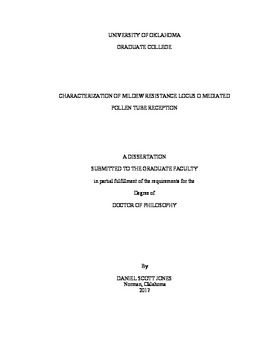| dc.description.abstract | Beyond its importance for the subsistence of all plant species, and thus life on earth, plant reproduction is fundamental to all human agricultural exploits. Understanding the mechanisms regulating reproduction is central to improving current agricultural practices in order to keep pace with a rapidly changing global environment. In flowering plants, intercellular communication controls every aspect of reproduction from pollination to double fertilization. In Arabidopsis thaliana, the MILDEW RESISTANCE LOCUS O (MLO) family protein NORTIA (NTA) is a critical component of reproductive communication regulating the final phase of sperm cell delivery, pollen tube (PT) reception. NTA is a seven-transmembrane protein that localizes to the endomembrane system of the synergid cell, a specialized cell in the embryo sac that controls the delivery of sperm cells through the processes of PT attraction and reception. MLO proteins regulate cell-cell communication in a number of physiological responses, including interactions with the biotrophic fungal pathogen powdery mildew and responses to mechanical stimuli during root growth. In this dissertation, I investigated the function of NTA within the process of PT reception through a structure-function analysis to determine the molecular and cellular requirements for MLO-mediated communication in this pathway. During these analyses, I generated a suite of markers expressed in the synergid cell that enables reproductive and cell biologists to study the secretory pathway of this specialized cell type. Additionally, I determined the expression patterns of two closely related MLO proteins (MLO10 and MLO8) in female reproductive tissues and generated lines to study the developmental effects of overexpressing MLO proteins. This dissertation contributes to our overall understanding of MLO-mediated communication, providing evidence of the molecular requirements for MLO function as well as identifying additional roles that MLOs may play during reproductive development and signaling. MLO proteins directly regulate many agronomically important developmental and environmental intercellular communication pathways. Thus, determining the molecular role of MLO proteins during reproductive communication can provide critical insight into how plants broadly regulate cell-cell communication across key processes. | en_US |
